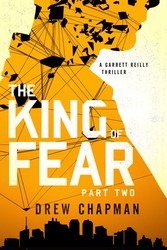The King of Fear (10 page)
Authors: Drew Chapman

Alexis smiled, but remained quiet. Wolinski had a certainty, a clarity. She seemed to know, not guess.
“Garrett's mentor Avery Bernstein made his fortune through the trafficking of data. He used it to buy and sell stocks and bonds to hisâand his clients'âadvantage. Information came to him in moments, and he passed it on moments later. In the intervening seconds he bought low and sold high. For Avery, another blessing. But he saw what happens when that information becomes dangerous. When a small trickle of information becomes a flood of data, real or imagined, and overwhelms our ability to sort truth from fiction. This is a real phenomenon.”
“Asset bubbles. Flash crashes. Panics,” Alexis said.
“Exactly.”
Alexis looked over to Garrett, who was staring right back at her. She realized that he'd been gauging her reaction. She guessed Garrett knew exactly what Wolinski was going to say, and that the entire interview was for Alexis's benefit.
“Because of interconnectivity, financial turmoil can spread across the globe in seconds,” Wolinski continued. “And every financial institution is linked, in some way or another, to every other institution. Banks trade with banks, which trade with hedge funds, which take out insurance policies against those banks, which bet on the debt of corporations, which store their money at that first set of banks. And all of them get lines of credit from each other. The CEOs of all of
these entities believe they are cleverly spreading the risks of financial meltdown among many companies, thus limiting their own exposure. If I sell a little bit of risk to many parties, then I am shrinking the overall risk to the national or global economy.”
“But you think the opposite is true,” Alexis said.
Wolinski nodded. “What if, by spreading little bits of risk throughout the system, you are actually
increasing
the chances of complete economic Armageddon? What if risk works not like a wildfire, where containment is key, and small amounts of fire are actually beneficial to a forest ecosystem, but more like a flu? Like a virus? Where even the smallest exposure sickens the entire host. And potentially kills it.
“The global economy is not healthy right now. Government debt is high. Bank exposure to exotic investment instruments is murky, and their capital requirements are too low. And civil unease is growing across the planet. The worldwide system is not prepared for a true shock. A small virus, a less than lethal flu, can kill a patient with a compromised immune system. To my mind, our system is dangerously compromised.
“So much right now in the modern economy is predicated on real-time events. âJust in time' manufacturing at factories and plants requires no lag time between the arrival of raw materials and their assembly into finished products. But that lack of lag time requires ready cashâor in the case of large companies, credit. And credit requires healthy banks, and a credit system functioning at the top of its game. Easy credit, fast credit. Supermarkets also require this, getting their produce and meats exactly when they need them, and not a moment sooner. They also require the fast flow of credit.
“When credit stops, work stops. Production stops. Food stops. And as a British member of parliament once famously said, âEvery city on the planet is a mere nine meals away from anarchy.' We miss one meal and we become cranky. Two and we are hungry.
But nine?
”
Garrett spoke up from across the room, taking up Wolinski's narrative. “If a big bankâa really big bankâgoes bad, from who knows whatâbad debts, exposure to bad debts, losses, or incompetenceâthen investors would run for the hills. But because all the big banks are so closely linked, the process of fleeing one bank would have the opposite effect.”
“Garrett is right,” Wolinski said. “Instead of protecting those fleeing the institution from risk, it would actually bring the risk back on themselves. We are all in a vast theater together. If someone yells fire, you cannot save yourself by fleeing. By fleeing, you bring the fire to the rest of the world.”
A chill ran down Alexis's spine. She realized she'd been holding her breath. She exhaled. “And if that were to happen?”
“Supply chains would collapse. Credit freezes, companies cannot pay their workers. Food and water would not be delivered. Electricity and gas would be shut down. Transportation would stop. ATM machines run dry. You would be limited to the cash you have on hand. A cascading chain of failure that could race around the countryâor the globeâin a matter of days. In some cases, hours. Think about that, Ms. Truffant. No power, no lights, no cash, no food in stores, no water from your tap. The entire enterprise comes to a sudden, grinding halt.”
Wolinski stopped for a moment. Alexis could hear a clock ticking in the hallway. Wolinski took a last sip of her wine, draining the glass empty.
“You may not want to hear this, Ms. Truffant, but we live in an economic house of cards. The dollars you have in your purse have value, of course, but they only retain that value as long as you believe in them. As long as everyone using those dollars believes in them. The moment you lose faith in your money, then it is simply a piece of paper, and nothing more.”
Alexis's mouth went dry. She wanted a sip of the professor's red wine. No, she wanted the entire bottle.
“It would not be easy,” Wolinski said. “And it would require great cunning. But the answer is, yes, an economic terrorist could destroy the global economy. They could send us all back to the barter system. Back to the Middle Ages.”
â¢Â â¢Â â¢
Alexis sat in the front seat of the rental car, Garrett at her side, as they drove south down Columbus Avenue. She stared out the windshield as the city fell into a somber, gloomy darkness. She tried to imagine what Professor Wolinski had described.
Supermarkets shuttered. Lights out. No water running. The city's rapid descent into chaos. People would march in the streets. Or worse, tear the streets apart. Tear each other apart. Was this governmentâor any governmentâprepared to deal with that? It would be like Hurricane Katrina, but on a massive scale. The veneer of civilization suddenly seemed like just thatâa veneer, a thin layer of rules and social niceties that held our baser motives in check. But could it really be that easy to push everything over the edge?
Perhaps it was already happening. Perhaps it was too late.
“I'll get you whatever you need,” she said, as the nighttime city flashed past her window.
“The Ascendant team. We'll need them.”
“It can be done.”
“What about Kline? How will you explain it to him?”
“I told him I was tracking down reporting errors in intelligence collating. Why I went to Miami. And here. I bought myself a day. Maybe two.”
“And after that?”
Alexis drove in silence for a moment. “I may have to go around him.”
Alexis could feel Garrett's gaze turn to her, in what she could only assume was amazement. Was she really going to go out on that particular limb, on what was, at least at the moment, speculative information? Deceive her boss and risk discharge, or worse?
Alexis could barely believe the words had come out of her mouth, but they had. She looked over at Garrett in the passenger seat. “So?”
“I'm in.” Garrett's mouth creased into a wry smile. “Let the hunt begin.”
ACKNOWLEDGMENTS
T
he following people were invaluable to me as I researched this book. My thanks to: Richard Campbell for his expertise on technology and banking security; Suresh Kotha of the University of Washington, for his ideas on how to bring the world of finance to its knees; Ian Toner for his primer on debt, derivatives and bank runs; the great Robert M. Solow for his insight into the weakness of the global economy; Daniel Goodwin, as always, for his views from inside the finance machine; Peter Loop for his detailed explanations of cryptocurrencies and black markets; Yevgeniya Elkus for her careful translation of English into Russian. And finally, to my sources at the Defense Intelligence Agency and the Federal Bureau of Investigation. You asked not to be named, for obvious reasons, but your insight was crucial.
My deepest gratitude to: Ragna Nervik, Dan Brecher and Markus Hoffmann for all the advice and support; the peerless Marysue Rucci, for shaping a mass of words and ideas into a bookâyou are the best; and my trusted inner circle of friends who lent a hand long the wayâyou know who you are. I couldn't have done it without you.
Finally, to Lisa, Augusta and Nora: thank you for putting up with the obsessions, the long hours, and the weeks away from home. You are the reason I write anything at all.
Bummed part one is already over? Read part two in the KING OF FEAR ebook series!
Read it now!

The King of Fear: Part Two
ORDER YOUR COPY TODAY!

ABOUT THE AUTHOR

Photograph by Lisa Loop
D
rew Chapman has written studio movies, directed an independent feature film, and created and written network and cable TV shows. Most recently, he wrote and co-executive produced a season of the spy thriller Legends for TNT. Married with two children, Chapman divides his time between Los Angeles and Seattle. The King of Fear is his second book.
MEET THE AUTHORS, WATCH VIDEOS AND MORE AT
A
LSO
BY
D
REW
C
HAPMAN
The Ascendant
We hope you enjoyed reading this Simon & Schuster eBook.
Sign up for our newsletter and receive special offers, access to bonus content, and info on the latest new releases and other great eBooks from Simon & Schuster.
or visit us online to sign up at
eBookNews.SimonandSchuster.com

Simon & Schuster Paperbacks
1230 Avenue of the Americas
New York, NY 10020
This book is a work of fiction. Any references to historical events, real people, or real places are used fictitiously. Other names, characters, places, and events are products of the author's imagination, and any resemblance to actual events or places or persons, living or dead, is entirely coincidental.
Copyright © 2015, 2016 by Andrew Chapman.
This book was previously published in three parts in ebook format.
All rights reserved, including the right to reproduce this book or portions thereof in any form whatsoever. For information, address Simon & Schuster Subsidiary Rights Department, 1230 Avenue of the Americas, New York, NY 10020.
First Simon & Schuster trade paperback edition February 2016
SIMON & SCHUSTER PAPERBACKS and colophon are registered trademarks of Simon & Schuster, Inc.
For information about special discounts for bulk purchases, please contact Simon & Schuster Special Sales at 1-866-506-1949 or
[email protected]
.
The Simon & Schuster Speakers Bureau can bring authors to your live event. For more information or to book an event, contact the Simon & Schuster Speakers Bureau at 1-866-248-3049 or visit our website at
www.simonspeakers.com
.
Library of Congress Cataloging-in-Publication Data
Chapman, Drew, author.
The king of fear : a Garrett Reilly thriller / Drew Chapman.âFirst Simon & Schuster trade paperback edition
pages cm
Sequel to: The Ascendant.
ISBN 978-1-4767-2591-8 (paperback)âISBN 978-1-5011-3105-9 (ebook part 1)âISBN 978-1-5011-3106-6 (ebook part 2)âISBN 978-1-5011-3107-3 (ebook Part 3)
1. Savants (Savant syndrome)âFiction. 2. BrokersâFiction. I. Title.
PS3603.H3635K56 2016
813'.6âdc23
2015032690
ISBN 978-1-4767-2591-8
ISBN 978-1-4767-2593-2 (ebook)